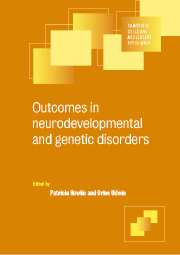Book contents
- Frontmatter
- Contents
- List of contributors
- Preface
- 1 Attention deficit hyperactivity disorder
- 2 Developmental language disorders
- 3 Reading and other specific learning difficulties
- 4 Metabolic disorders
- 5 Hemiplegic cerebral palsy
- 6 Autistic disorders
- 7 Down syndrome
- 8 Fragile X syndrome
- 9 Prader-Willi and Angelman syndromes: from childhood to adult life
- 10 Rett disorder
- 11 Tuberous sclerosis
- 12 Williams and Smith-Magenis syndromes
- Index
6 - Autistic disorders
Published online by Cambridge University Press: 13 August 2009
- Frontmatter
- Contents
- List of contributors
- Preface
- 1 Attention deficit hyperactivity disorder
- 2 Developmental language disorders
- 3 Reading and other specific learning difficulties
- 4 Metabolic disorders
- 5 Hemiplegic cerebral palsy
- 6 Autistic disorders
- 7 Down syndrome
- 8 Fragile X syndrome
- 9 Prader-Willi and Angelman syndromes: from childhood to adult life
- 10 Rett disorder
- 11 Tuberous sclerosis
- 12 Williams and Smith-Magenis syndromes
- Index
Summary
Introduction
Autism is a pervasive developmental disorder that is usually apparent from early childhood (Volkmar, Stier & Cohen, 1985). It is characterized by deficits in three domains: communication; social understanding, and rigid and repetitive patterns of behaviour; and it is this combination of difficulties that constitutes the basic diagnostic criteria for the disorder (American Psychiatric Association, 1994 – DSM-IV; World Health Organization, 1992 – ICD–10, see Table 6.1).
The condition was first systematically described by Leo Kanner in the United States (US) in 1943, but a remarkably similar account, written by Hans Asperger in Austria, appeared at much the same time (Asperger, 1944; Frith, 1991). Debate continues as to whether autism and Asperger syndrome are quantitatively or qualitatively different (Schopler, Mesibov & Kunce, 1998) and in particular whether Asperger syndrome should be distinguished from high functioning autism (i.e. IQ > 70; Volkmar, Klin & Cohen, 1997). Szatmari, Bartolucci & Bremner (1989a) in a comparative outcome study of 28 individuals with Asperger syndrome and 25 with high functioning autism, concluded that ‘there were no substantive, qualitative differences’ between them. In contrast, Klin & Volkmar (1997) suggested that there may be certain neuropsychological differences between the two conditions. However, on the basis of present knowledge, it appears that there are few major differences, either in early history or outcome, between these two groups, when IQ is controlled for.
- Type
- Chapter
- Information
- Outcomes in Neurodevelopmental and Genetic Disorders , pp. 136 - 168Publisher: Cambridge University PressPrint publication year: 2002
- 11
- Cited by

